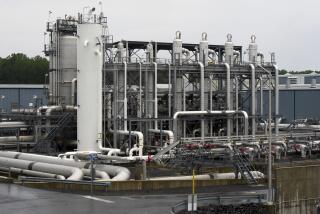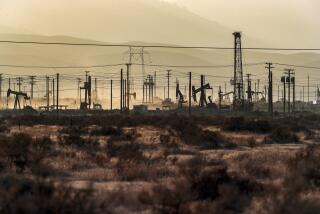Administration blocks more Bush-era oil shale development leases
The Interior Department on Wednesday blocked a Bush administration plan to open parts of the Mountain West for oil shale development, announcing that it would first study the water, power and land-use issues that complicate one of the nation’s most abundant but controversial untapped sources of energy.
Interior Secretary Ken Salazar canceled shale development leases on federal land in Colorado, Utah and Wyoming and launched a second round of leases in the region limited to research purposes. In doing so, he rebuked what he called former President George W. Bush’s “headlong rush” to begin development.
“Those who have fantasized that oil shale is a panacea for America’s energy needs have been living in a fantasy land,” he said.
The move marked the third time in a month that the Obama administration has frozen late-term Bush decisions that sought to spur domestic energy development over objections from environmentalists.
President Obama has repeatedly pledged to reduce dependence on foreign oil, an effort he frequently links to his plans to spend billions on renewable-energy research, enhanced electricity transmission, efficiency improvement and other “green” areas of the economic stimulus bill.
That spending focuses almost exclusively on electricity use in homes and commercial buildings, but more than two-thirds of the oil consumed by the U.S. is devoted to transportation. Though Obama has called for accelerated efforts to develop electric cars, they are presently only a small fraction of all vehicles on the road.
That suggests the administration’s energy initiatives, at least in the early stages, may not substantially reduce oil imports.
Glenn Vawter, executive director of the National Oil Shale Assn., said Salazar’s decision on shale leases wasn’t a surprise. But critics say the string of Interior announcements, which include canceling some oil leases near national parks and lengthening the public comments process for new offshore drilling, amount to reducing the effort to boost domestic oil production.
“Despite the valuable progress being made in the development of new energy sources and technologies, there is still no viable substitute for oil,” Karen Harbert, president and chief executive of the U.S. Chamber of Commerce’s Institute for 21st Century Energy, told a congressional hearing on offshore drilling Wednesday.
Interior Department aides noted that even Bush officials, testifying before Congress last year, estimated that oil shale wouldn’t be commercially viable until 2016 at earliest. Salazar said the department was not “anti-development.”
“We want to be thoughtful and deliberate as we move forward,” he said.
He also said he expected plug-in electric vehicles to play a large role in the administration’s energy independence plans.
Replacing Bush’s leases with additional research leases, Salazar said, will allow the department to examine the unresolved issues of shale, major deposits of which are in Colorado and other mountain states. Among the issues: how much power and water it would require to extract -- and where, in the often-parched West, the water would come from.
Some studies of commercial shale development have suggested that the technology would consume huge quantities of water and produce mountains of potentially toxic waste material.
Environmentalists celebrated Wednesday’s announcement.
“This is a huge step forward in protecting America’s Western lands from oil shale development, which is nothing more than a dirty, expensive pipe dream,” said Bobby McEnaney, lands advocate for the Natural Resources Defense Council.
--
nicholas.riccardi@latimes.com
More to Read
Start your day right
Sign up for Essential California for news, features and recommendations from the L.A. Times and beyond in your inbox six days a week.
You may occasionally receive promotional content from the Los Angeles Times.






